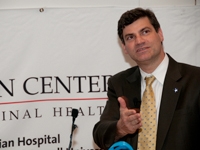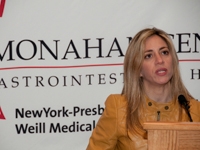Five nights a week, millions watch Katie Couric deliver the day's top stories on the "CBS Evening News." On Thursday, March 26, Couric followed her broadcast with another public address. Although on a much smaller scale, this appearance was just as important to her.
Couric spoke that night as part of a free seminar on colon cancer screening and prevention organized by The Jay Monahan Center for Gastrointestinal Health at NewYork-Presbyterian Hospital/Weill Cornell Medical Center. Monahan, a well-known New York City defense attorney, passed away in 1998, about two years after he was first diagnosed with late-stage colon cancer. He and Couric were married in 1989 and had two children together.
Since her husband's death, Couric has become a very public and effective advocate for colon cancer screening, even undergoing a colonoscopy on television when she was a co-host on NBC's "The Today Show."

Katie Couric with Dr. Felice Schnoll-Sussman and Dr. Mark Pochapin.
"I was put in a position where I had a very public job and a very personal tragedy," Couric said while answering questions from the audience at the Monahan Center.
Dr. Mark Pochapin, director of the Monahan Center and Monahan's physician during his illness, lauded Couric's efforts to raise awareness for colorectal cancer. The disease is the second-leading cause of cancer-related deaths in the United States, he noted, but also one of the most preventable and curable cancers as well.
Dr. Pochapin was joined at the seminar by Dr. Felice Schnoll-Sussman, director of research at the Monahan Center.
Colon cancer occurs in both men and women, and while anyone with a colon is at risk, people aged 50 or older are much more likely to develop the disease than younger adults. Family history of either colon cancer or polyps are also strong risk factors, as are lifestyle considerations, such as a diet high in red and processed meats.

Dr. Mark Pochapin
Screening and removal of colon polyps is the key to preventing colorectal cancer, Dr. Pochapin said.
"No polyps equals no cancer," he said.
While the colonoscopy remains the industry standard, Dr. Pochapin said there are several new tests that can also be used to screen for polyps. One, a CT colonoscopy, captures a virtual image of the colon. However, with this virtual screening, the colon still must be empty prior to the test and inflated with air during it — two aspects that can make a standard colonoscopy somewhat uncomfortable.
Dr. Schnoll-Sussman discussed the latest research behind both the causes of colon cancer and potential genetic indicators that may lead to even better screening options.

Dr. Felice Schnoll-Sussman
Diet and exercise are both important factors to consider in colon cancer prevention, Dr. Schnoll-Sussman said. While research has resulted in conflicting reports on whether vitamin D or a high-fiber diet may prevent colon cancer, she noted that neither would hurt.
There is no debate, however, about obesity.
"Obesity is absolutely linked to polyp production and colon cancer," Dr. Schnoll-Sussman said, stressing that even a moderate amount of exercise can facilitate colon health.
Photography by Amelia Panico.

